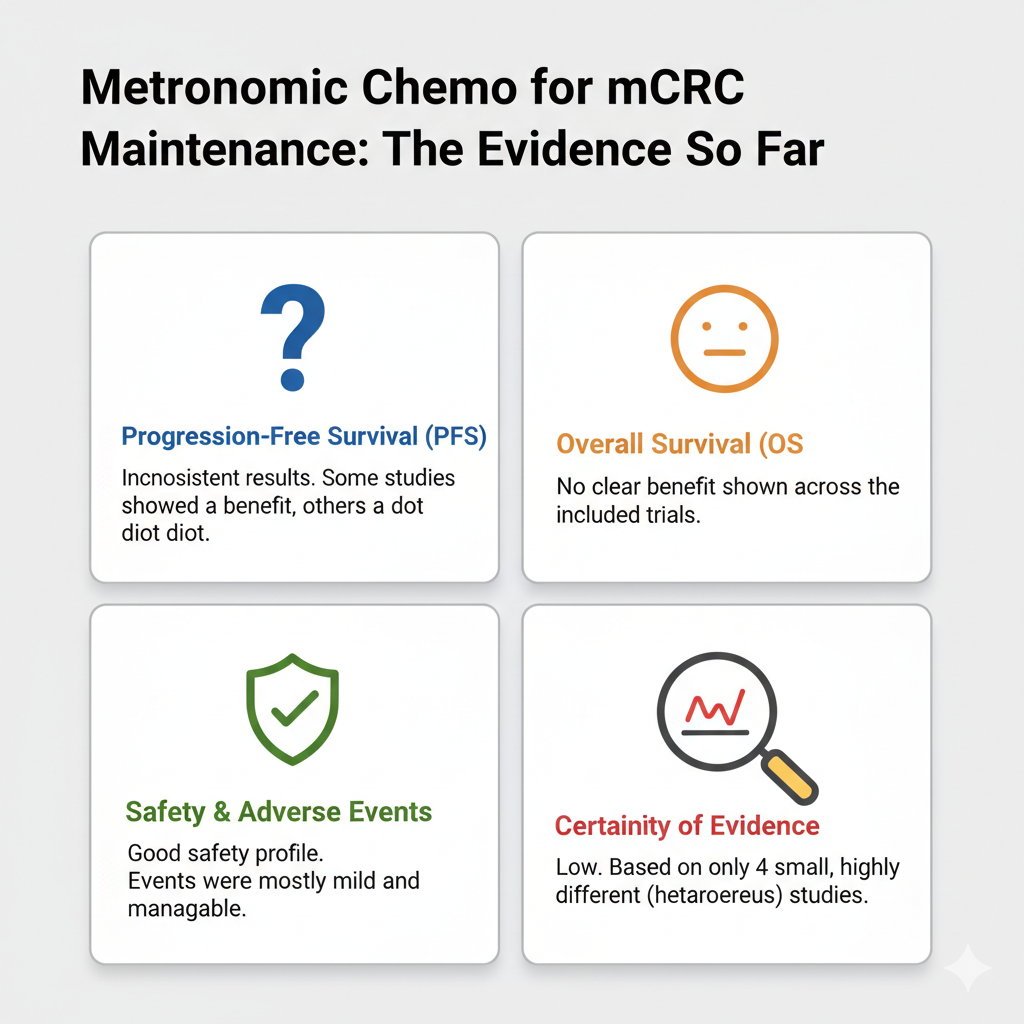
Comment:
This systematic review is, predictably, hampered by significant heterogeneity and an insufficient number of trials, preventing any definitive conclusions. However, an optimistic signal does emerge. The review strongly reinforces the primary value proposition of metronomic chemotherapy: an exceptionally favorable safety profile, with a striking lack of severe hematological toxicity. Furthermore, despite the mixed data, two of the four RCTs did demonstrate a significant progression-free survival benefit. I’m always one to focus on overall survival, however on a risk-benefit balance, if there is low risk, it’s easier to take for the potential benefit.
Summary:
Clinical Bottom Line
This systematic review of four small, heterogeneous randomized controlled trials (RCTs) suggests that metronomic chemotherapy (MC) as maintenance for metastatic colorectal cancer (mCRC) is relatively safe and may improve progression-free survival (mPFS) in some patients. However, the evidence for an overall survival (mOS) benefit is lacking, with most included trials showing no significant improvement. The findings are inconsistent across trials, and the review’s conclusions are limited by the small number of studies and variations in their design and control groups.
Results
Summary of Results
The review included 4 RCTs with a total of 836 patients. The authors did not perform a meta-analysis due to high methodological heterogeneity and insufficient data for quantitative synthesis. The findings on efficacy were mixed and are presented narratively:
-
Progression-Free Survival (mPFS):
-
Two RCTs showed that metronomic maintenance chemotherapy significantly improved mPFS compared to an observation-only group. One of these trials (Geng et al.) reported an mPFS of 5.66 months with metronomic capecitabine versus 3.98 months for observation. The other (Simkens et al.) reported an mPFS of 8.5 months for metronomic capecitabine plus bevacizumab versus 4.1 months for observation.
-
One RCT (Hagman et al.) showed that mPFS in the metronomic capecitabine group was not inferior to the bevacizumab maintenance group (3.7 vs. 3.9 months, respectively).
-
The final RCT (Cremolini et al.) found that adding dual-agent MC (capecitabine + cyclophosphamide) to bevacizumab maintenance did not improve mPFS compared to bevacizumab monotherapy (10.3 vs. 9.4 months).
-
-
Overall Survival (mOS):
-
The benefit for mOS was not established. Three of the four included RCTs showed that metronomic maintenance therapy could not effectively improve mOS when compared to either an observation group or bevacizumab maintenance therapy.
-
The remaining RCT reported that mOS in the metronomic chemotherapy group was similar to the bevacizumab maintenance group.
-
-
Safety (Adverse Events – AEs):
-
AEs were reported as “mostly mild and manageable”. No deaths related to AEs were reported across the included studies.
-
Grade ≥ 3 AEs were predominantly non-hematological. Of the 304 reported Grade ≥ 3 AEs, 96.71% were non-hematological, such as hand-foot syndrome (HFS), mucosal inflammation, and diarrhea. Hematological toxicity accounted for only 3.29% of Grade ≥ 3 AEs.
-
Assertive Critical Appraisal
-
Certainty of Evidence (GRADE Framework): The authors did not use the GRADE framework. However, based on the described limitations, the overall certainty of this evidence is Low. This is due to the very small number of included studies (serious limitation to precision), the high methodological heterogeneity preventing meta-analysis (serious inconsistency), and the unclear risk of bias in half of the included trials (serious risk of bias).
-
Heterogeneity: The authors explicitly state that a meta-analysis was not performed because the tabulated results indicated “high methodological heterogeneity between the studies”. This is a critical limitation. This inconsistency stems from major differences in the study designs, including:
-
Different Control Groups: Comparators included observation-only, bevacizumab monotherapy, or placebo.
-
Different Interventions: The metronomic regimens varied, including single-agent capecitabine, dual-agent capecitabine + cyclophosphamide, and combinations with bevacizumab.
-
-
Publication Bias: The authors did not report an assessment for publication bias (e.g., using a funnel plot). Given the small number of included studies, such an analysis would have been unreliable, but the risk of missing negative trials remains.
-
Risk of Bias in Included Studies: The quality of the four included RCTs was variable.
-
Using the modified Jadad score, two articles were rated as high quality (5 points) and two were rated as low quality (3 points).
-
A formal risk of bias assessment (using RevMan software) found two articles had a low risk of bias, while two had an “unclear risk of bias”.
-
The authors note that allocation concealment and blinding were not used in “some of these studies,” which is a significant methodological flaw that can inflate treatment effects.
-
-
Reporting Quality Assessment (PRISMA): The review adheres to some key PRISMA principles. It includes a PRISMA flow diagram (Fig. 1) illustrating the study selection process and describes the databases searched and keywords used.
-
Additional Limitations (per Authors): The review authors appropriately identified several other key limitations:
-
The number of included studies is “very small” (only 4 RCTs), which affects the reliability and generalizability of the conclusions.
-
Two of the included RCTs were sponsored by pharmaceutical companies. In one of these studies, the sponsor “participated in the trial design,” which may have introduced bias.
-
Research Objective
The review’s objective was to assess the efficacy (mPFS, mOS) and safety (AEs) of metronomic chemotherapy (MC) for patients with mCRC whose disease was in remission or stable after first-line induction therapy and who were in need of maintenance treatment (MT).
Study Design
-
This is a systematic review of randomized controlled trials (RCTs).
-
Search Strategy: The authors searched PubMed, Embase, Cochrane Library, Wanfang, CNKI, and VIP databases for relevant articles published as of February 28, 2022.
-
Selection Criteria: The review included RCTs of mCRC patients with an Eastern Cooperative Oncology Group performance status (ECOG PS) of ≤ 2 who had received 16 to 24 weeks of first-line induction chemotherapy and achieved a response or stable disease. The intervention arm received single- or dual-drug MC (with or without a targeted drug), and the control arm received observation or targeted drug MT.
Setting and Participants
-
Included Studies: 4 RCTs were included in the final review.
-
Total Participants: The 4 trials included a total of 836 patients. 413 patients were randomized to an MC treatment group, and 423 were randomized to a control group (observation or bevacizumab monotherapy MT).
Bibliographic Data
-
Title: Efficacy and safety of metronomic chemotherapy in maintenance therapy for metastatic colorectal cancer: A systematic review of randomized controlled trials
-
Authors: Li Chen, Xin Cao, Jing Li, ChaoMin Liu, Ting Jiang
-
Journal: Medicine
-
Year: 2022
-
DOI: 10.1097/MD.0000000000031659
This AI-generated analysis is for informational and research purposes only and is not a substitute for professional medical advice, diagnosis, or treatment. Always seek the advice of a qualified health provider with any questions you may have regarding a medical cond1ition.
Original Article:
Open Access
